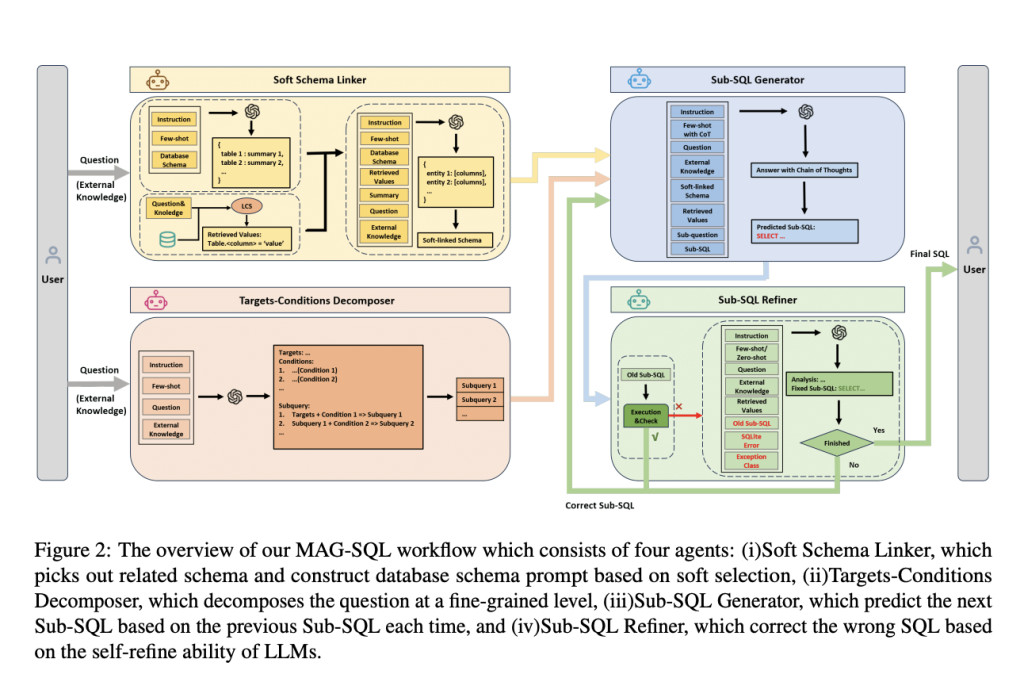Text-to-SQL conversion is a vital aspect of Natural Language Processing (NLP) that enables users to query databases using everyday language rather than technical SQL commands. This process is highly significant as it allows individuals to interact with complex databases seamlessly, regardless of their technical expertise. The challenge lies between natural language queries and the structured language of SQL, especially as database schemas grow more complex and queries become increasingly intricate. As a result, developing efficient and accurate text-to-SQL models is crucial for enhancing data accessibility and usability across various applications.
The difficulty in translating natural language into SQL stems from several factors, including the complexity of database schemas and the multifaceted nature of user queries. Many existing methods need help to cope with these challenges, leading to a considerable disparity between the performance of these models and that of humans, particularly on demanding datasets like BIRD. For instance, the BIRD dataset presents significant hurdles with its large-scale databases and intricate queries requiring external knowledge. This gap in performance underscores the need for more sophisticated approaches that can effectively handle the nuances of natural language and complex database interactions.
To date, methods have been employed to tackle the Text-to-SQL problem. In-context learning (ICL) and supervised learning are the most common approaches. These methods, while successful to some extent, often require extensive fine-tuning and large-scale sampling from language models. However, these techniques have limitations. They tend to fall short when faced with complex database schemas, leading to inaccuracies in the SQL generation process. The MAC-SQL method, for example, though a significant advancement, only achieved a baseline accuracy of 57.56% on the BIRD dataset using GPT-4, which is far from the ideal performance level required for real-world applications.
A research team from South China University of Technology and Tsinghua University introduced MAG-SQL, a novel multi-agent generative approach designed to enhance the Text-to-SQL process. This innovative method combines multiple agents working collaboratively to improve the accuracy of SQL generation. The MAG-SQL framework includes a Soft Schema Linker, Targets-Conditions Decomposer, Sub-SQL Generator, and Sub-SQL Refiner, each crucial in refining the SQL queries generated from natural language inputs. By incorporating soft schema linking and iterative sub-SQL refinement, the researchers have created a method that significantly outperforms previous approaches.
The Soft Schema Linker component is designed to filter the database schema, selecting only the most relevant columns for SQL generation. This process is crucial for reducing the amount of irrelevant information and enhancing the accuracy of the generated SQL commands. The Targets-Conditions Decomposer breaks down complex queries into more manageable sub-queries, which are then processed iteratively by the Sub-SQL Generator. This generator creates SQL sub-queries based on the previous ones, ensuring a step-by-step refinement of the SQL command. Finally, the Sub-SQL Refiner corrects any errors in the generated SQL queries, further improving the overall accuracy of the process.
MAG-SQL’s performance on the BIRD dataset highlights its effectiveness. When tested using GPT-4, MAG-SQL achieved an execution accuracy of 61.08%, a notable improvement over the 46.35% baseline accuracy of vanilla GPT-4. Moreover, even when using GPT-3.5, MAG-SQL outperformed the MAC-SQL method with an accuracy of 57.62%, demonstrating its robustness and the significant potential of the multi-agent generative approach. MAG-SQL’s performance on the Spider dataset, another complex benchmark, showed an 11.9% improvement over GPT-4’s zero-shot baseline, proving its generalizability and effectiveness across different datasets.
In conclusion, MAG-SQL addresses the critical challenges of translating natural language into SQL commands. By utilizing a multi-agent framework and focusing on iterative refinement, MAG-SQL offers a more accurate and reliable method for generating SQL queries, particularly in complex scenarios involving large-scale databases and intricate queries. The research team’s approach improves performance on challenging benchmarks like BIRD and Spider and demonstrates the potential of multi-agent systems in enhancing the capabilities of large language models.
Check out the Paper. All credit for this research goes to the researchers of this project. Also, don’t forget to follow us on Twitter and join our Telegram Channel and LinkedIn Group. If you like our work, you will love our newsletter..
Don’t Forget to join our 48k+ ML SubReddit
Find Upcoming AI Webinars here
The post MAG-SQL: A Multi-Agent Generative Approach Achieving 61% Accuracy on BIRD Dataset Using GPT-4 for Enhanced Text-to-SQL Query Refinement appeared first on MarkTechPost.
Source: Read MoreÂ



